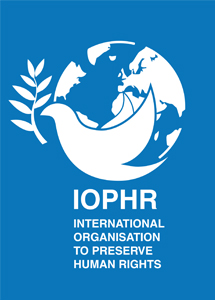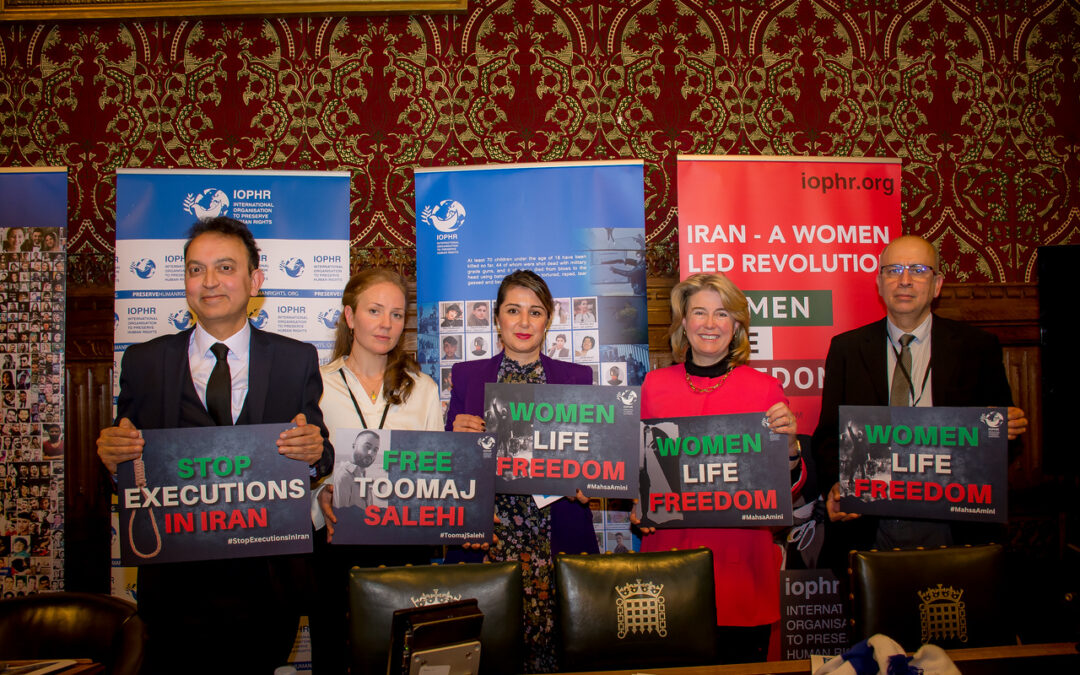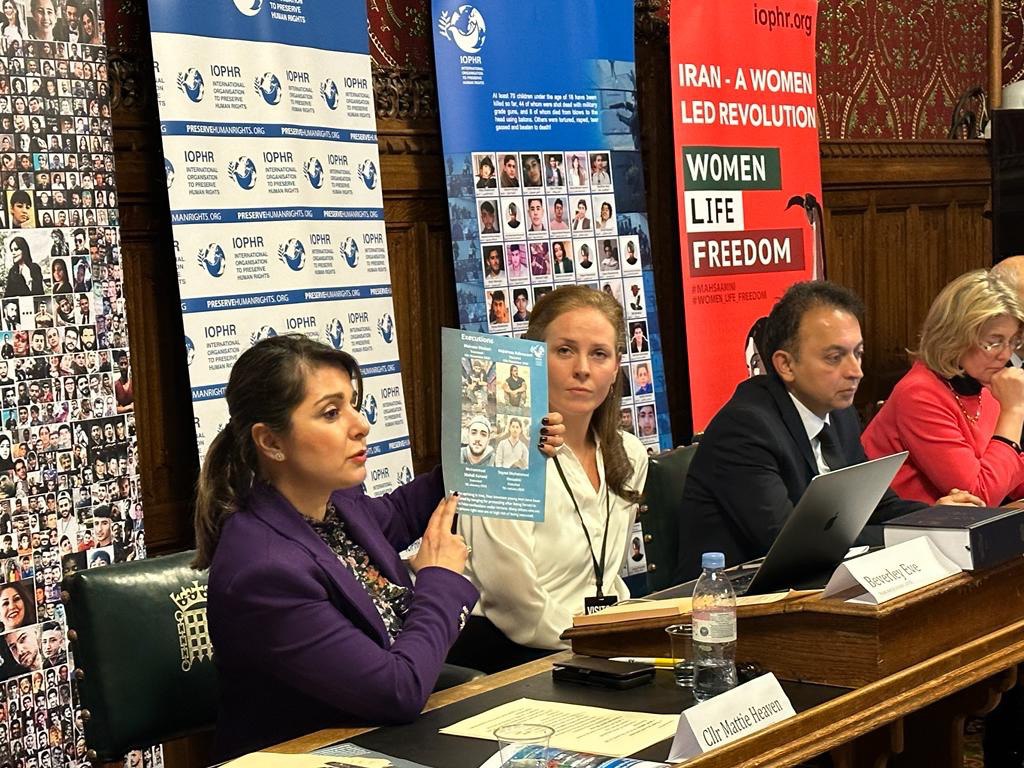On the 8th February, IOPHR held an event at the UK parliament under the title of: “How to Stop the Global Threat of the Iranian Regime”. The speakers at this event were Javaid Rehman – The UN Special Rapporteur on the Situation of Human Rights in the Islamic Republic of Iran, Anna Firth MP – a Member of UK Parliament, Mattie Heaven – the Director of IOPHR and the Regional Deputy Chairman for the Conservative Party, Afshin Sajedi – IOPHR Representative at the European Parliament, and the chair of the event and the Director of IOPHR, Beverley Eve.
The event began with Javaid Rehman giving a verbal report on the human rights situation in Iran since the September uprising, which began as a result of the murder of Mahsa Amini by the Iranian security forces, whilst she was in custody for not wearing a Hijab. Mr Rehman in his report stated that since the murder of Mahsa Amini, there have been widespread protests in Iran which has led to the murder of at least 527 protestors that included at least 34 women and 71 children. He also in his report mentioned that over 20,000 protestors have been arrested since September, many of whom, whilst in custody, have been subjected to torture, rape and sexual assault by the Iranian security forces. He also highlighted the lack of legal procedure in these arrests, and theatre-style judicial trials, where many of the protestors are sentenced to death in a quick manner, without any judicial review and under trumped up charges. He also reported on the danger of mass executions of protestors, who are either currently facing death sentences, or will do so once their case is processed.
Furthermore, Mr Rehman gave a detailed report of religious and ethnic persecution in Iran, and also pointed to over 500 executions during 2022, at least two of which included juvenile offenders. He also asked for the UK and other Western governments to condemn Iran for all its human rights violations, and bring the perpetrators of these crimes to justice.
Mr Rehman also mentioned the Iranian regime’s hostage taking policy of dual nationals in Iran, which the regime uses to impose its will on Western governments. He also gave a detailed report of repression of journalists and censorship in Iran. He also asked the Western governments to use technology to break this oppressive censorship, and to stand up to the Iranian regime’s terrorist activities in the Middle East and the West. He ended by asking the Western governments to put human rights at the top of their agenda in any dealings with Iran, and use this to pressure the Iranian regime to change its inhuman actions against its own people.
The next speaker of the event, was Mattie Heaven who gave an update on human rights situation in Iran since the IOPHR’s last event in the UK parliament, and named the 4 protestors, as well as a British-Iranian citizen who were recently executed in Iran. She also stressed the importance of the movement in support of putting the IRGC on the international terrorist list, which has started and must not be allowed to be halted, so that IRGC finally faces extreme sanctions. She also stressed that the Iranian regime does not represent the Iranian people, and the West must recognise this fact. She added that the Iranian regime represents a great global danger to the Western governments before naming a few of the IRGC’s terrorist activities outside and inside of Iran. Mattie Heaven mentioned the IRGC’s oppressive policy within and outside of Iran, and some of the hundreds of acts of terrorism conducted by them. Ms Heaven then listed some of the Iranian regime’s money laundering, human trafficking and drug trafficking activities, after which she stated that we must recognise that the Iranian regime is the enemy of the West, and we must place the IRGC on the terrorist list, as soon as possible, before it is too late. She also stated that there is no point in negotiating with the Iranian regime in regards to its nuclear program, as Iran has consistently failed to keep its previous pledges, and thus it can never be trusted to keep any of its promises. She added that we must not allow ourselves to be in a situation where we wake up one day and find out that the Iranian regime has built its first nuclear bomb! She also pointed to the activities of the Iranian diplomats who help the IRGC in its global terrorist activities, and thus diplomatic relations with Iran must be severely restricted! As most of the current Iranian diplomats are either a part of the IRGC or have deep connections to it. She also asked all the Western governments to remove their diplomats from Iran as the Iranian regime has a history of attacking Western embassies. She also asked the West to help the Iranian people in their efforts to change the regime in Iran, as for the first time in over four decades the Iranian regime is weak and lacks the ability to completely stop the protests.
The third speaker was Afshin Sajedi, who began his presentation with Shakespeare’s famous quote of “To be or not to be?” when posing the question of the Iranian Regime’s position within the international community. Mr Sajedi spoke about how the Iranian regime cannot be recognised as a nation-state, like we see in most countries, as it has a similar structure to many Mafia organisations and it consist of two tiers. The lower tier is its face to the international community with a president and ministers, but with no decision and policy making abilities. Meanwhile its upper tier is the real ruler of Iran and it is controlled by the IRGC and ultimately by the Iranian Supreme Leader, Ali Khamenei. Therefore, the Western governments must realise that when they deal with the Iranian regime, they are in fact dealing with a corrupt, organised criminal terrorist organisation, and thus they must not give it the same credence as they do to a government that represents the people of that country. Thus, they must bar the Iranian regime from all international bodies, as the regime will use all these access points to further its terrorist and criminal activities. Mr Sajedi further added that the regime does not see itself answerable to any type of authority, apart from its Supreme Leader. Mr Sajedi concluded that the Iranian Regime’s recognition must be reduced from De Jure to De Facto.
The forth speaker was Anna Firth, who started her speech by thanking IOPHR for its efforts and its expertise on the issue of Iran. She also stated that the majority of MPs in the UK are in support of putting the IRGC on the terrorist list, and she herself has mentioned this point to the UK government, and the parliament is simply waiting for the Government to follow through with this. She also expressed sadness for what has happened to Iran and its citizens over the last decades, and how Iran has regressed by hundreds of years. However, Mrs Firth was hopeful that the latest uprising that is led by the women of Iran, will finally be a source for permanent change in Iran, even though all the Iranian citizens are paying a high price for their protests. She also stated that we, as part of the international community, must support the brave people of Iran in their efforts to overthrow the criminal regime controlling Iran. She also said that the West must not impose a government on Iran, and must simply support the Iranian people’s effort for change.
The final speech of the event was from Beverley Eve who gave a report on the last five month’s human rights situation in Iran. She also mentioned the dangers posed by the IRGC to Western societies by pointing to the recent published ‘MI5 Annual Threat Update’.
The International Organisation to Preserve Human Rights
London, Brussels, Berlin, Toronto, Washington
11th February 2023




